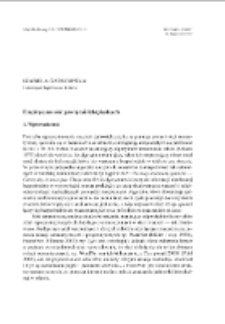- Wyszukaj w całym Repozytorium
- Piśmiennictwo i mapy
- Archeologia
- Baza Młynów
- Nauki przyrodnicze
Wyszukiwanie zaawansowane
Wyszukiwanie zaawansowane
Wyszukiwanie zaawansowane
Wyszukiwanie zaawansowane
Wyszukiwanie zaawansowane

Obiekt
Tytuł: Empiryczna sieć powiązań leksykalnych
Wydawca:
Instytut Języka Polskiego Polskiej Akademii Nauk
Miejsce wydania:
Typ obiektu:
Abstrakt:
The properties of experimentally built association networks were studied from many different points of view. The results of those investigations show that if one aims to treat an empirical network as a ‘natural dictionary’ suitable for text processing algorithms, one should develop a consistent and linguistically valid set of semantic relationships which may explain information borne by word associations. The aim of this paper is describe a preliminary set of relationships which are applicable to word associations, and show how those associations, if classified, define the meaning of a noun which is a node of the network.
Czasopismo/Seria/cykl:
Tom:
Strona pocz.:
Strona końc.:
Szczegółowy typ zasobu:
Format:
Identyfikator zasobu:
10.17651/POLON.35.13 ; oai:rcin.org.pl:57756
Język:
Prawa:
Prawa zastrzeżone - dostęp nieograniczony
Zasady wykorzystania:
Digitalizacja:
Instytut Języka Polskiego Polskiej Akademii Nauk
Dostęp:
Kolekcje, do których przypisany jest obiekt:
- Repozytorium Cyfrowe Instytutów Naukowych > Kolekcje Partnerów > Instytut Języka Polskiego PAN > Czasopisma
- Repozytorium Cyfrowe Instytutów Naukowych > Kolekcje Partnerów > Instytut Języka Polskiego PAN > Dziedziny nauki > Nauki humanistyczne > Językoznawstwo > Językoznawstwo teoria i metodologia
- Repozytorium Cyfrowe Instytutów Naukowych > Kolekcje Partnerów > Instytut Języka Polskiego PAN > Dziedziny nauki > Nauki humanistyczne > Językoznawstwo > Językoznawstwo polonistyczne
- Repozytorium Cyfrowe Instytutów Naukowych > Kolekcje Partnerów > Instytut Języka Polskiego PAN > Dziedziny nauki > Nauki humanistyczne > Językoznawstwo > Współczesny język polski
- Repozytorium Cyfrowe Instytutów Naukowych > Kolekcje Partnerów > Instytut Języka Polskiego PAN > Artykuły
- Repozytorium Cyfrowe Instytutów Naukowych > Piśmiennictwo > Czasopisma/Artykuły
Data ostatniej modyfikacji:
2 paź 2020
Data dodania obiektu:
24 sty 2016
Liczba pobrań / odtworzeń:
1304
Wszystkie dostępne wersje tego obiektu:
https://rcin.org.pl./publication/78143
Wyświetl opis w formacie RDF:
Wyświetl opis w formacie RDFa:
Wyświetl opis w formacie OAI-PMH:
| Nazwa wydania | Data |
|---|---|
| Empiryczna sieć powiązań leksykalnych / Gatkowska, Izabela | 2 paź 2020 |
Obiekty Podobne
Gatkowska, Izabela
Maryn-Stachurska, Dagmara
Plinius Secundus, Caius (23–79) Gelen, Sigmund (1497–1554) Lechler, Martin ( –1594) Feyerabend, Sigmund (1528–1590) Núñez, Hernán (1475–1553) Scaliger, Joseph Juste (1540–1609) Lipsius, Justus (1547–1606) Nicolaus, Joannes Saint-André, Pierre de (1555–1624) Turnèbe, Adrien (1512–1565)

 INSTYTUT ARCHEOLOGII I ETNOLOGII POLSKIEJ AKADEMII NAUK
INSTYTUT ARCHEOLOGII I ETNOLOGII POLSKIEJ AKADEMII NAUK
 INSTYTUT BADAŃ LITERACKICH POLSKIEJ AKADEMII NAUK
INSTYTUT BADAŃ LITERACKICH POLSKIEJ AKADEMII NAUK
 INSTYTUT BADAWCZY LEŚNICTWA
INSTYTUT BADAWCZY LEŚNICTWA
 INSTYTUT BIOLOGII DOŚWIADCZALNEJ IM. MARCELEGO NENCKIEGO POLSKIEJ AKADEMII NAUK
INSTYTUT BIOLOGII DOŚWIADCZALNEJ IM. MARCELEGO NENCKIEGO POLSKIEJ AKADEMII NAUK
 INSTYTUT BIOLOGII SSAKÓW POLSKIEJ AKADEMII NAUK
INSTYTUT BIOLOGII SSAKÓW POLSKIEJ AKADEMII NAUK
 INSTYTUT CHEMII FIZYCZNEJ PAN
INSTYTUT CHEMII FIZYCZNEJ PAN
 INSTYTUT CHEMII ORGANICZNEJ PAN
INSTYTUT CHEMII ORGANICZNEJ PAN
 INSTYTUT FILOZOFII I SOCJOLOGII PAN
INSTYTUT FILOZOFII I SOCJOLOGII PAN
 INSTYTUT GEOGRAFII I PRZESTRZENNEGO ZAGOSPODAROWANIA PAN
INSTYTUT GEOGRAFII I PRZESTRZENNEGO ZAGOSPODAROWANIA PAN
 INSTYTUT HISTORII im. TADEUSZA MANTEUFFLA POLSKIEJ AKADEMII NAUK
INSTYTUT HISTORII im. TADEUSZA MANTEUFFLA POLSKIEJ AKADEMII NAUK
 INSTYTUT JĘZYKA POLSKIEGO POLSKIEJ AKADEMII NAUK
INSTYTUT JĘZYKA POLSKIEGO POLSKIEJ AKADEMII NAUK
 INSTYTUT MATEMATYCZNY PAN
INSTYTUT MATEMATYCZNY PAN
 INSTYTUT MEDYCYNY DOŚWIADCZALNEJ I KLINICZNEJ IM.MIROSŁAWA MOSSAKOWSKIEGO POLSKIEJ AKADEMII NAUK
INSTYTUT MEDYCYNY DOŚWIADCZALNEJ I KLINICZNEJ IM.MIROSŁAWA MOSSAKOWSKIEGO POLSKIEJ AKADEMII NAUK
 INSTYTUT PODSTAWOWYCH PROBLEMÓW TECHNIKI PAN
INSTYTUT PODSTAWOWYCH PROBLEMÓW TECHNIKI PAN
 INSTYTUT SLAWISTYKI PAN
INSTYTUT SLAWISTYKI PAN
 SIEĆ BADAWCZA ŁUKASIEWICZ - INSTYTUT TECHNOLOGII MATERIAŁÓW ELEKTRONICZNYCH
SIEĆ BADAWCZA ŁUKASIEWICZ - INSTYTUT TECHNOLOGII MATERIAŁÓW ELEKTRONICZNYCH
 MUZEUM I INSTYTUT ZOOLOGII POLSKIEJ AKADEMII NAUK
MUZEUM I INSTYTUT ZOOLOGII POLSKIEJ AKADEMII NAUK
 INSTYTUT BADAŃ SYSTEMOWYCH PAN
INSTYTUT BADAŃ SYSTEMOWYCH PAN
 INSTYTUT BOTANIKI IM. WŁADYSŁAWA SZAFERA POLSKIEJ AKADEMII NAUK
INSTYTUT BOTANIKI IM. WŁADYSŁAWA SZAFERA POLSKIEJ AKADEMII NAUK




































